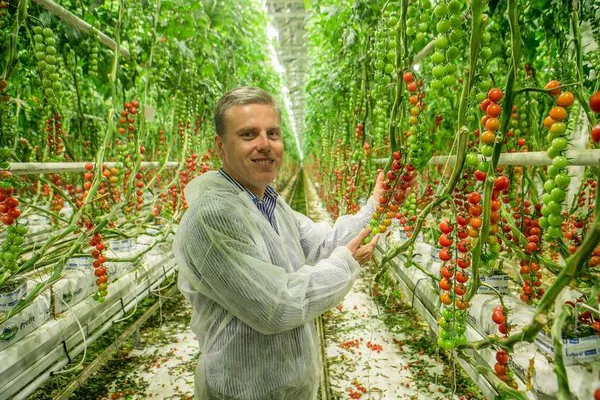Veresi Paradicsom, which produces tomato specialties, has received the ‘Mother Earth’ recognition of Koppert Biological Systems, the market leader in the field of biological plant protection and natural pollination, for paying maximum attention to biological pest control. The Hungarian company is the only recipient of this award in the CEE region.
Over the past year, Veresi Paradicsom has won several prestigious awards, including the Ernst & Young ‘New Generation Production Technologies Special Award’, the ‘Highlights of Hungary’ Forbes special award, the Hungarian Ministry of Agriculture's ‘Agricultural Innovation Award’, and most recently, the Koppert Biological Systems ‘Mother Earth Diploma for Biological Plant Protection’. The latter was awarded to the company for its efforts to strive for chemical-free biological plant protection with innovative technology, growing premium tomato specialties in Veresegyháza, east of Budapest, including one of the sweetest varieties in the world.

Shipping to the finest restaurants
In Hungary's most state-of-the-art greenhouse with artificial backlighting, the firms grow the same delicious, high-quality and high-nutrient tomatoes every day of the year, including the autumn and winter seasons, making unnecessary the imports of more than a thousand tons of tomatoes from abroad. In addition to shops, the Veresi produce also reaches the Hungarian Michelin-starred restaurants, shipping tomatoes to the Onyx restaurant in Budapest managed by Ádám Mészáros and to the Stand Restaurant, also in the capital, managed by Szabina Szulló and Tamás Széll.
Special cultivation method
The outstanding quality of the tomatoes in all respects, in addition to the use of excellent seeds, is due to the fact that, as an environmentally friendly solution, no unnecessary chemicals are used in cultivation, pollination is carried out by bumblebees, pest control by wasps and predators. In a closed hydroculture system, the stems are planted in Sri Lankan organic coconut fiber quilt instead of earth, which is compostable, meaning it does not burden the environment after use, and irrigation water is constantly monitored so that only controlled substances can enter the tomatoes.
It is no coincidence that the pure cultivation process of Veresi Tomato is now a curriculum at several universities and has now been recognized by Koppert Biological Systems, which offers sustainable crop production solutions and is present in more than a hundred countries. With the Mother Earth Diploma in Biological Plant Protection, the Dutch company congratulates Veresi Tomato for its commitment to the environmentally conscious cultivation, free of unnecessary chemicals, of food plants, to which Koppert Biological Systems Naturpol bumble bees also contribute.
Protecting the ecosystem
Koppert Biological Systems, located in the southern part of the Netherlands, has been a world leader in biological plant protection for more than fifty years, aiming to make agriculture healthier, safer and more productive in partnership with nature. All this is accomplished by using natural enemies of pests to fight pest infections, using bumblebees for natural pollination, and supporting and strengthening the underground and above-ground parts of plants with bio-stimulants. According to their philosophy, healthy crops and a balanced environment are based on restoring and protecting the ecosystem in a natural way.
For more information:
Veresi Paradicsom
www.veresiparadicsom.hu

Ministry of agriculture, nature and food quality of the Netherlands
www.government.nl/en
